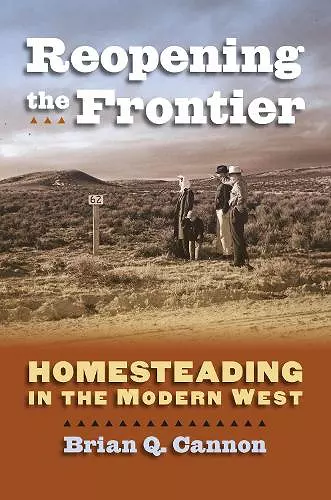Reopening the Frontier
Homesteading in the Modern West
Format:Hardback
Publisher:University Press of Kansas
Published:21st Apr '09
Currently unavailable, our supplier has not provided us a restock date

The offer of free farmland after World War II may not have sparked the same stampede that it did in frontier days, but, as Brian Cannon shows in this path-breaking study, postwar homesteading continued to shape the modern West in important ways. Between 1946 and 1966, the Bureau of Reclamation opened up over 3,000 farms on irrigated public lands in the West to returning servicemen. Although involving fewer people than those flocking to western cities, this mini - land rush represents an important continuity in western tradition through the cultivation of values - hard work, security, independence, family stability - long associated with frontier life. Cannon examines these new agricultural settlements and the values they reflected and reinforced, following them through the end of the twentieth century and exploring specific key homesteading and federal reclamation projects. Cannon describes how the Bureau of Reclamation used lotteries to make available free land that had previously been part of Indian reservations, used for Japanese internment, or abandoned by unsuccessful settlers. He then traces the new homesteaders' experiences in establishing a farm, 'proving up,' and gaining title to the land, contrasting the realities of modern homesteading with iconic views of the frontier. Combining archival research with oral history, Cannon opens up genuinely human vistas in the homesteading process. He chronicles the hard life that many of the settlers faced and details wrangling over water policy - which both influenced and was influenced by westerners' shifting perception of the frontier - as well as the impact of shifting values and priorities on agricultural communities. Examining a number of homesteading efforts, he focuses particularly on the failed Riverton Project in central Wyoming, where after fifteen years a group of settlers petitioned Congress for restitution; and the Klamath Project in northern California, where attempts to open new homesteads aroused nationwide opposition from wildlife and sportsmen's organizations. Cannon concludes by examining the continued appeal of homesteading even in the twenty-first century, as individuals seeking to reorient their lives - and local governments seeking to repopulate their districts - have reinvented homesteading. ""Reopening the Frontier"" opens up a little-studied aspect of modern western history to show that the pioneer spirit lives on.
Cannon's insightful and sensitive treatment impressively captures the hopes, dreams, and struggles of these latter-day pioneers.... A fine addition to the history of the West, environmental history, and rural and agricultural history. David B. Danbom, author of Born in the Country: A History of Rural America ""An excellent and essential sequel to Paul W. Gates's magisterial History of Public Land Law Development and well worthy of serious consideration by various prize committees."" Allan G. Bogue, author of Frederick Jackson Turner: Strange Roads Going Down ""A unique and well-written work that should be read by historians and other students of the West, its land development, and the impact of the federal government."" Walter Nugent, author of Into the West: The Story of Its People
ISBN: 9780700616572
Dimensions: 233mm x 160mm x 27mm
Weight: 623g
304 pages